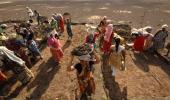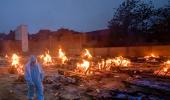The caste census has already become a hot-button issue.
Unless settled earlier, it will echo loudly in the coming assembly elections and eventually in the 2024 parliamentary poll, notes Virendra Kapoor.

Slowly but certainly the demand for a caste census is gaining traction.
Given its electorally sensitive nature, it may no longer be a question of if, but when the Modi government will give the go-ahead.
A country-wide head-count of thousands of castes and sub-castes in a nation of 135 crore people is a stupendous task, entailing a huge financial burden and the deployment of lakhs of school teachers and other personnel.
But thanks to a combination of factors, the caste census has already become a hot-button issue.
Unless settled earlier, it will echo loudly in the coming assembly elections and eventually in the 2024 parliamentary poll.
Caste-based parties are aggressively pitching for it after the Supreme Court recently put the ball back in the government's court.
The apex court said it was for the government to undertake such a task while it would abide by the 50 percent ceiling on all reservations, including those for the existing SCs, STs and the OBCs.
Newer groups clamoring for reservations such as the Marathas in Maharashtra, the Jats in Haryana and UP, Patels in Gujarat, etc, find that the 50 percent upper limit thwarts their ambition for a higher share in government jobs and educational seats.
They grouse that thanks to the reservations OBCs seem to be getting a larger share of the national cake while they are being left behind.
In order to quell the street protests by those outside the reservation net, some states had announced reservations for these groups as well while being fully aware of the 50-percent ceiling.
Not surprisingly, the apex court nixed the latest reservations on the ground that these exceeded the half-way ceiling.
This in turn prompted leaders like Sharad Pawar and Nitish Kumar to demand that the Centre undertake a Constitutional amendment to undo the Supreme Court cap of fifty percent on reservations.
A few days ago, an all-party delegation from Bihar, led by Chief Minister Nitish Kumar met the prime minister to press for the caste-wise census.
It was significant that BJP leader and former Bihar deputy chief minister Sushil Modi publicly supported the call for a caste census.
Earlier, the government had pushed through the 127th Constitution Amendment Bill in the recent session of Parliament which empowered states to conduct a caste census in order to include or exclude castes from the OBC list.
Votaries of the nation-wide caste census saw this as a clever ploy by the Centre to push the ball in the court of the states while the Centre itself stayed on the sidelines, refraining to burn its fingers in what is essentially a controversial issue.
Critics of the caste reservations argue that such an exercise would open the Pandora's box, further fragmenting the society on caste-and sub-caste lines.
Upper castes particularly were against caste reservations, fearing it would sound the death-knell of whatever remained of the meritocratic system.
More importantly, the fear of a caste survey stems from the anxiety of the upper castes --- the votaries of the merit system --- that their actual numbers may be far lower than currently presumed.
Conversely, the assumption is that the actual number of OBCs may be far higher than the 27 percent.
Pointedly, even the Mandal Commission, which submitted its report back in 1980, had estimated that the OBCs numbered 52 percent of the total population.
Since 1980, the share of the OBCs in the total population had gone up further.
The relatively better educated and well-off upper castes tend to have fewer children than those from the intermediate and other groups such as the SCs and STs.
It is another matter that most white-collar professions, including politics, have traditionally been the preserve of the upper castes.
Notably, the first three Parliaments after Independence were dominated by the Brahmins, their percentage close to three-fourths of the total number of MPs.
Given that the last country-wide caste census was conducted in 1931, undertaking a caste-count nearly a hundred years later is bound to move the clock back on ridding caste as a determinant of one's value in the job and educational market.
The RSS, the parent body of the present ruling BJP, has all along championed a caste-less Hindu society --- Jati-viheen samaj
A caste census would deter from its project, though critics point out that barring the lone sarsanghchalak Rajinder Singh, all heads of the Nagpur-headquartered organisation since its inception in 1925 were Brahmins who also dominate its upper organisational hierarchy.
Founding fathers of the Republic had envisioned the SCs and STs reservations lasting only for the first ten years.
It was believed that after a decade the traditionally depressed groups would attain a measure of social and educational parity with the higher castes.
However, these have been extended indefinitely and even if all the SCs, STs were to match the level of a Bill Gates or a Jeff Bezos, no government would dare nullify them.
It is in the nature of reservations that they become perennial, with the beneficiary groups developing a vested interest in their continuance.
For proof, consider the futile efforts to keep out the `creamy layer' from the OBC reservations.
With caste increasingly playing a stellar role in electoral politics --- notice how the BJP expanded its support by incorporating more and more castes from the Economically Most Backward castes in the OBC pool, enumerating caste affiliations nation-wide may have now become inevitable.
The ruling party spotlighted the induction of a record number of MBCs in the recently expanded Modi ministry.
Clearly, this was done with an eye on the coming UP assembly election.
Besides, central ministers belonging to the BJP's allies have lent public support to the demand for a caste survey.
It may be that at one time the BJP had vehemently deplored the injection of caste in politics.
Indeed, it was less than enthusiastic about the Mandal reservations.
But now it is adept at co-opting various castes and sub-castes in order to beat the self-avowedly caste-based parties at their own game.
Therefore, it would wait for the electorally opportune time to sanction the caste-based survey.
The RSS project to usher in a casteless society now lies in tatters.
Feature Presentation: Aslam Hunani/Rediff.com











 © 2025
© 2025